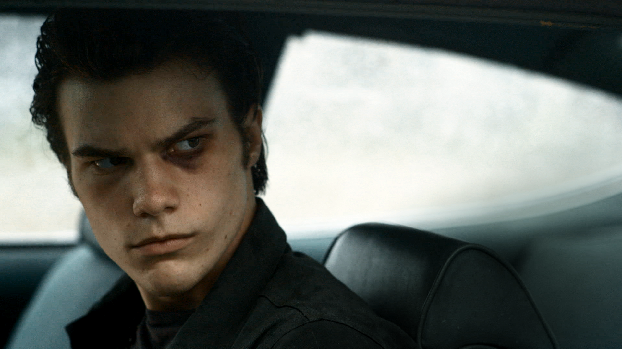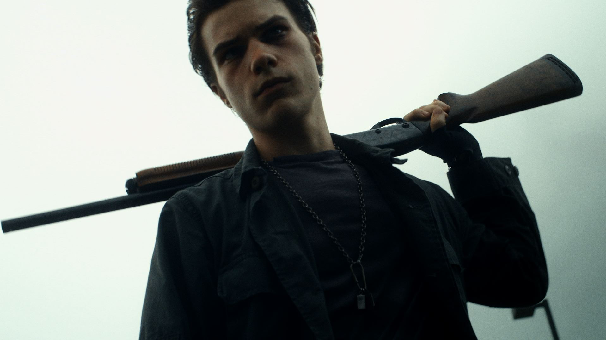Striving to prove you have a more versatile personality and a wide range of emotions and sentiments to people who have come to view only one side of your identity can be a challenge for many people, no matter what their age is or the experiences they’ve had. The main character in director Tim McCann’s new independent drama, ‘White Rabbit,’ which opens tomorrow in theaters and on VOD, is a teenage boy who’s suffering from an untreated mental illness, and has to try to prove to his family and peers that he’s not the timid boy they thought they knew. From his alcoholic and neglectful father, who doesn’t truly understand his son’s thoughts and behavior, to the wayward new girl in his school who only uses him in order to mischievously get what she wants, the film grippingly showcases the harrowing emotional neglect of a young man who’s struggling to survive, but doesn’t know how to ask for help.
‘White Rabbit’ follows Harlon (Nick Krause), who has been tormented since childhood by visions of the white rabbit his father, Darrell (Sam Trammell) forced him to kill while hunting as a young boy. Now that Harlon is a bullied teenager, his undiagnosed mental illness is getting worse. He begins to hear voices, and his imagination threatens to prompt him to carry out violent acts. A rebellious new girl, Julie (Britt Robertson), moves to town, and she and Harlon become fast friends. But when she betrays Harlon, the rabbit along with other imaginary characters taunt him into committing one final act of revenge.
Krause generously took the time recently to talk about playing Harlon in ‘White Rabbit’ during an exclusive interview. Among other things, the actor discussed how after he begin studying the symptoms and effects of schizoaffective disorder, he began to ponder the thoughts, visions and events that occurred in Harlon’s life that completely disturbed his emotional balance, and led him to commit the malicious, and at-times violent, acts towards the people closest to him; how he found it helpful that he and McCann held similar ideas about Harlon’s character structure and arc, as well as the meanings of certain events and objects in his life, while they were filming; and how he and Trammell didn’t truly build characters’ relationship before they began filming, which he thinks really helped show that Harlon and his father have had an emotional distance between them for most of the teen’s life.
ShockYa (SY): You play Harlon in the new drama, ‘White Rabbit.’ What was it about the character, as well as the script overall, that convinced you to take on the role?
Nick Krause (NK): The sheer challenge of it. I loved the story as soon as I saw it-it was so well put together. Plus, the opportunity of playing such a layered, complex and human character like Harlon, who was tested to such a personal degree, was something I couldn’t pass up.
SY: Harlon is a bullied high school student, whose undiagnosed mental illness gets worse as he gets older. He begins to hear voices, and his imagination encourages him to carry out violent acts once he enters high school. What kind of research did you do in order to prepare for your role as Harlon, and better connect with his emotional descent the more his illness progressed?
NK: I got a copy of the DSM, as well as a variety of online resources, to begin studying up on schizoaffective disorder. That was the clear first step to me – to start as objectively as possible.
After I felt I had a good grasp on the clinical aspect, I started going down the rabbit hole, so to speak, of how it would affect me to see the kinds of things that Harlon saw, and what kind of thoughts, visions and events would hold enough personal meaning to get me teetering on the same edge as him. It was almost like introspection with malicious intent, to go through my own mind, spot the support beams, and see just what it would take to knock them down and unsteady myself. Now, I feel mentally and emotionally more tempered from the experience, but as I was going through it, it knocked me off of my guard to trap myself in that space for the shoot.
SY: How closely did you work with ‘White Rabbit’s director, Tim McCann, to develop and showcase Harlon’s emotional and mental development and motivations, from the time he was a young boy to the time he was in high school?
NK: We held a few meetings before shooting started to make sure we were on the same page, as far as Harlon’s character structure and arcs of change were concerned, as well as to discuss the meanings of certain events and objects in his life as he saw them. I found it very helpful to know that we shared many of the same ideas while we were shooting, and the process through which we worked together was much much smoother because of it.
SY: Harlon is a troubled teen who has been tormented by visions since his alcoholic father, Darrell, who’s played by Sam Trammell, forced him to kill an innocent rabbit while they were hunting when he was a boy. While Darrell recognizes the error in his parenting skills later in Harlon’s adolescence, how did you and Sam work together to showcase the strained relationship between the father and son earlier in your character’s life?
NK: Sam and I didn’t do a whole lot of premeditation on our characters’ relationship, which I think really helped on screen. Part of the relationship between Harlon and his father is their emotional distance and the sheer unpredictability of what either is going to do next. Not knowing what the other actor’s decisions were going to be in the next scene gave a wider ground of conflict, and a more natural “on the spot” feel, to the relationship. Since Sam took such a physical route for Darrell, and I took a more reserved and quiet approach, in the way we carried our bodies on screen, I think the natural display was really effective.
SY: Things begin to improve for Harlon when the rebellious Julie, who’s played by Britt Robertson, moved to his town and befriended him. But when she betrayed him, the imaginary characters in his comic books taunt him into committing an act of revenge against her and the rest of their peers who bullied him. What was the process of building your working relationship with Britt, in order to showcase the initial connection Harlon feels to Julie, before their friendship become estranged?
NK: We were both more or less in character on and off of screen during the shoot. So I think that a lot of our working relationship was just having conversations as our real selves while still in the body and profiles of movement that our characters had. Since actors tend to drop their personal boundaries with each other when meeting on set, I think that helped a lot in subconsciously instantiating that on screen relationship that we had.
SY: What was the process of filming ‘White Rabbit’ independently? Did that process pose any challenges while you were on the set, or did it offer you more creative freedom to develop Harlon the way you envisioned him?
NK: (Filming the movie independently led to) a little bit of both. Working on an independent set can be very fluid and moment-by-moment, which is a boon to those sudden “a-ha” moments that you get when you’re really in the creative space, but it can also lead to some added stress from the occasional unpredictability. I think that for this project, the lack of the rigid formalism you might find on, say, a TV set, helped a lot. I had a lot of creative freedom and opportunities to make strong decisions with faith that the scene and story would adapt naturally.
SY: ‘White Rabbit’ is going to be released in theaters and VOD. Do you enjoy watching films On Demand, and do you think the platform is beneficial for independent films like this one?
NK: I do! I think that as time goes on there’s a greater divide between large IMAX style thrill rides and smaller movies that sell more of a unique personality as their main attraction. I think that platforms like Netflix and VOD offer a chance for an audience to get much more invested in what they’re watching, since they’re in the comfort of their home without any unwanted distractions. I also think that digital and On Demand platforms offer a much wider market penetration for niche projects to find their audience, as well as the opportunity for audiences to find that movie they never knew they were going to love. Overall, it means more choice, more creative freedom and more movies being made. It’s a win-win for everybody.
SY: ‘White Rabbit’ had its world premiere at the Zurich Film Festival, before having its North American premiere at the 2014 Catalina Film Festival, where it won Best Feature Film. You also won Best Actor for your role of Harlon at the Boston Film Festival. Were you able to attend any of the film’s festival screenings, and if so, what was that experience like overall? What does it mean to you that audiences embraced your performance?
NK: I’ve attended a couple of screenings now, and the experience is always awesome. It’s a great feeling to know that people out there are interested in, and affected by something you were a part of.
As for the awards, they’re not the reason I act, and I never work on a project hoping for, or expecting, them, but it’s a nice cherry on top for the whole thing. I personally have very little ability to look at myself objectively on screen, so it’s a great feeling to get that recognition and to know that someone felt a connection to a character I portrayed.
SY: Besides films, you have also appeared on such television shows as ‘Parenthood’ and ‘Grimm.’ What is it about acting on television that you also enjoy, and how does it compare and contrast to starring in movies?
NK: It’s a really different kind of process. I love working on television because it moves so fast – you’re always on your toes and the day to day is very electric. On a film set, things move slower. You may be breaking down your character much more, and shooting to display a subtextual arc in every scene to keep the development of the character intact on a month long shoot (or longer). Whereas on TV, you don’t always have that luxury – you have to just relax and play, trust that your puzzle piece is going to fit into the story, and keep up with the schedule. Both are a neat challenge.
SY: Besides ‘White Rabbit,’ do you have any other upcoming projects that you can discuss?
NK: Yes! I have a film called ‘Darwin,’ which slated to come out later this year. It’s a sci-fi in a futuristic setting where I play a character searching for human connection in a world where all of our interactions are entirely and forcibly digital. Keep an eye out for it!
Check out images of Krause in character as Harlong in, and watch the trailer for, ‘White Rabbit’ below.
Written by: Karen Benardello


